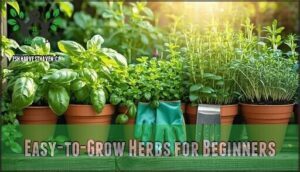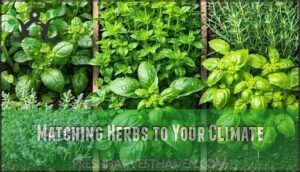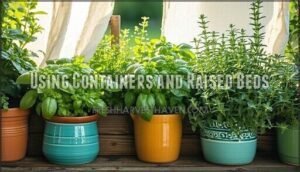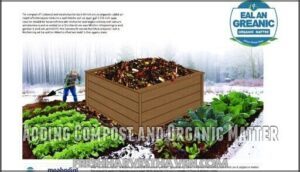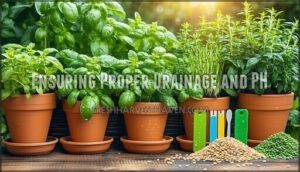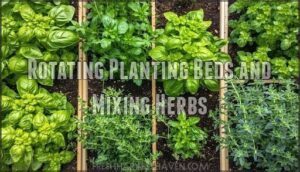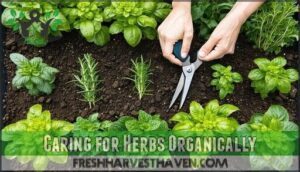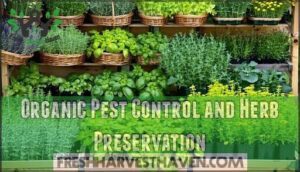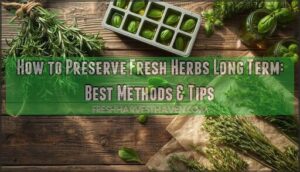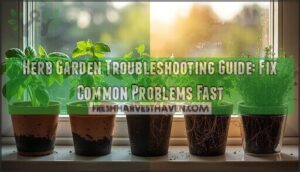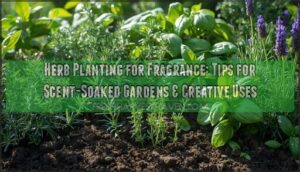This site is supported by our readers. We may earn a commission, at no cost to you, if you purchase through links.
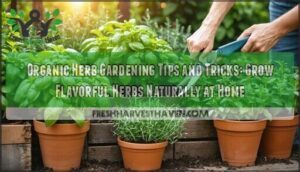
Prune and pinch to keep plants bushy, and use homemade sprays like garlic water to keep bugs at bay. Match herb varieties to your climate, and you’ll be harvesting fresh flavor in no time. There’s more to explore, too!
Table Of Contents
- Key Takeaways
- Choosing The Best Location for Herb Gardens
- Selecting and Planting Organic Herb Varieties
- Building Healthy Organic Soil
- Caring for Herbs Organically
- Organic Pest Control and Herb Preservation
- Frequently Asked Questions (FAQs)
- What are the secrets to growing herbs?
- What herbs cannot be planted next to each other?
- What is the most successful way to grow herbs?
- What is the best fertilizer for organic herbs?
- Can you grow herbs in a garden?
- How to grow a healthy herb garden?
- How do I Keep my organic garden healthy and productive?
- How do you make a good herb garden?
- Can You shortcut a perfect organic garden?
- How do you stop a herb garden from overspreading?
- Conclusion
Key Takeaways
- Pick a sunny spot with good drainage and mix in compost or worm castings for healthy, flavorful herbs.
- Water deeply but not too often—let the soil dry out between waterings to prevent soggy roots.
- Pinch and prune your herbs regularly to keep them bushy and extend harvests.
- Use homemade sprays like garlic water and companion planting to control pests naturally without chemicals.
Choosing The Best Location for Herb Gardens
You’ll want to pick a spot for your herb garden that gets plenty of sunlight, has good drainage, and is easy to reach for daily care.
If your herbs are stuck in a shady corner or far from the kitchen, you might spend more time searching for them than actually cooking with them.
Assessing Sunlight and Shade
Anyone growing herbs should check sunlight duration and light intensity before planting. Most herbs thrive in a full sun area, but shade tolerance varies—mint and chives can handle less light. Watch for microclimates near walls or under trees. Reflective surfaces, like patios, can boost sunlight needs. Consider herb garden illumination for ideal growth. Always match your herbs’ growing conditions to their sunlight and shade preferences for best results.
Considering Accessibility and Drainage
After checking sunlight, think about Accessible Design—make sure your herb garden is easy to reach for regular care.
Good Drainage Solutions matter, too. Use raised beds or containers with drainage holes to keep roots healthy. Mix in Soil Amendments for a well-drained soil mix.
Container Placement and Mobility Considerations help you move herbs if puddles threaten their roots.
Growing Herbs Indoors Vs. Outdoors
Once you’ve sorted out drainage, it’s time to weigh growing herbs indoors versus outdoors. Indoor gardens let you fine-tune Light Requirements, Temperature Control, and Humidity Levels—perfect for winter or unpredictable weather. Outdoors, you’ll get better Air Circulation but may battle more pests. Both options offer unique growing conditions, so pick what suits your herb garden goals and lifestyle.
South-facing windows are ideal due to ample sunlight exposure.
Selecting and Planting Organic Herb Varieties
Choosing the right herb varieties sets the foundation for a thriving organic garden that’ll reward you with fresh flavors all season long.
You’ll want to start with beginner-friendly options and match your selections to both your local climate and growing setup.
Easy-to-Grow Herbs for Beginners
Five beginner herb choices will transform your cooking without overwhelming you as a new gardener. Basil, mint, chives, cilantro, and oregano are low-maintenance herbs that practically grow themselves.
These culinary herb starts adapt well to containers and deliver quick herb harvests within weeks. Your herb garden success starts with these foolproof varieties that forgive mistakes while you’re learning.
Matching Herbs to Your Climate
Your herb garden’s success depends on choosing plants that match your local weather patterns. Mediterranean herbs like oregano and lavender love hot, dry conditions with full sun. Cool-climate gardeners should focus on cold-hardy perennial herbs like chives and sage that survive freezing temperatures. Heat-loving herbs such as basil thrive in warm, humid areas.
Consider your microclimate considerations too – a sunny, protected spot might support tender annual herbs even in cooler regions. For those in coastal areas, consider herbs that thrive in such environments, like basil and rosemary, for their drought-resistant properties.
Using Containers and Raised Beds
Growing herbs in pots offers flexibility for small garden spaces. Choose containers at least 6 inches deep, with cedar or terra cotta materials providing excellent drainage. Remember, proper watering containers need drainage holes to prevent root rot.
Raised bed designs enhance growing space while improving soil control. Vertical gardening systems work perfectly for herb garden containers on patios.
Use quality potting mixes with compost for ideal growth. Consider herb pairing guidelines to boost growth.
Building Healthy Organic Soil
You’ll need nutrient-rich soil to grow herbs that burst with flavor and stay healthy all season long. Building the right foundation means mixing in compost, checking your soil’s pH levels, and planning where each herb will thrive in your garden.
Adding Compost and Organic Matter
You’ll want to feed your herb soil like you’re building a foundation for success. Compost types like vegetable scraps and yard waste break down into rich soil amendments that boost nutrient uptake by 30-40%. Adding organic matter through worm castings increases root growth by 25%, while creating the perfect soil mix.
A balanced pH guarantees optimal nutrient availability. This natural fertilizer approach beats synthetic options every time, giving your herbs the mulch benefits they crave.
Ensuring Proper Drainage and PH
Good drainage prevents your herbs from drowning, while proper soil pH levels guarantee they can absorb nutrients effectively. Test your soil using pH strips or digital meters – most herbs prefer slightly acidic to neutral conditions between 6.0-7.0. For containers, drill multiple drainage holes and use well-drained potting mix with organic matter for ideal growing conditions.
Add drainage materials like coarse sand or perlite to heavy soils. Herbs also need at least four hours of sunlight each day to thrive.
Rotating Planting Beds and Mixing Herbs
Smart gardeners know that moving your herb garden around each year pays off big time. Crop rotation lowers soil-borne diseases by 50%, keeping your herb plants healthier longer. Mix different herbs together for natural pest control benefits.
Here’s your rotation strategy:
- Annual herbs (basil, cilantro) in year one, perennial herbs (oregano, chives) in year two
- Heavy feeders (basil, parsley) followed by light feeders (thyme, rosemary)
- Companion planting pairs like basil with tomatoes for improved soil health
This simple shuffle keeps your soil mix fresh and your growing herbs thriving naturally.
Caring for Herbs Organically
Once you’ve built healthy organic soil, you’ll need to care for your herbs properly to keep them thriving throughout the growing season.
Smart watering, natural feeding, and proper pruning techniques can boost your herb yields by 30% or more while maintaining that fresh, flavorful taste you’re after.
Watering Techniques and Scheduling
You’ll want to water herbs deeply but less often to encourage strong root growth. Check soil moisture by sticking your finger two inches down—if it’s dry, it’s time to water.
Most herbs need watering every 2-3 days in containers, less in well-drained garden beds. Water at soil level early morning to reduce evaporation and prevent fungal issues.
Natural Fertilizers and Organic Amendments
After proper watering, feed your herb garden with organic amendments that’ll make your plants thrive. Fish emulsion delivers nutrients quickly, boosting seedling development by 15%. Worm castings contain five times more nitrogen than regular soil. Apply compost tea monthly to boost disease resistance, cutting leaf spot by 40%. Seaweed extract adds over 60 micronutrients for better flavor and vigor.
Many gardeners purchase quality fertilizer options for their gardens. Manure tea supplies steady nitrogen for continuous growth.
Pruning, Pinching, and Harvesting for Yield
Regular pruning techniques and pinching frequency dramatically boost your harvest yields. Fresh herbs respond best to gentle pinching rather than aggressive cutting, optimizing yield through careful maintenance.
Pinch basil tips weekly to prevent flowering, extending harvest periods by weeks. Morning harvesting methods capture peak essential oils for maximum flavor.
Use sterilized tools when herb harvesting to prevent disease spread.
Organic Pest Control and Herb Preservation
You’ll want to protect your herb harvest naturally while keeping those plants healthy and pest-free throughout the growing season. Organic methods work best since you’re planning to eat these herbs, and proper preservation techniques will help you enjoy your garden’s bounty all year long.
Companion Planting and Beneficial Insects
When you’re planning your herb garden guide, think of companion plants as your green bodyguards. Herb guilds featuring basil, chives, and marigolds create natural barriers while attracting pollinators like ladybugs.
These beneficial insects feast on aphids, protecting your growing herbs. Strategic herb plants placement promotes trap cropping methods, where pests target specific herbs instead of vegetables, creating thriving insect habitats that boost garden health naturally.
Homemade Natural Pest Sprays
When pests crash your herb garden party, you don’t need harsh chemicals to show them the door. These DIY Garlic Sprays and Essential Oil Sprays pack a punch while keeping your herbs safe for the dinner table.
Here’s your natural pest-fighting arsenal:
- Garlic blend – Mix 3-6 cloves per quart of water with soap for 88% aphid control
- Chili pepper spray – Steep hot peppers overnight, strain, and spray for caterpillar deterrent
- Mint infusions – Simmer fresh herbs 20 minutes for spider mite repellent
- Neem oil mixture – Dilute 1-2 teaspoons per quart for long-lasting protection
These Herbal Infusions work by disrupting pest behavior rather than killing, so beneficial insects stick around. Employing companion planting strategies can further deter pests naturally. Apply early morning or evening to prevent leaf burn.
Harvesting, Drying, and Freezing Herbs
Once you’ve tackled pests, it’s time to think about harvest timing. Snip fresh herbs early in the morning for peak flavor.
Drying methods like air-drying or using a dehydrator keep those leaves crisp. Freezing techniques—think ice cube trays—work well for basil and parsley.
Smart herb storage means you’ll have preserved herbs ready for all your favorite culinary uses.
Frequently Asked Questions (FAQs)
What are the secrets to growing herbs?
If you want herbs that grow faster than weeds, give them compost-rich soil, water in the morning, and pinch leaf tips often.
Use deep containers, rotate beds yearly, and harvest early for the strongest flavors.
What herbs cannot be planted next to each other?
Keep basil away from sage and rue, since they compete for nutrients and stunt each other’s growth.
Fennel’s a lone wolf—don’t plant it with other herbs, or it’ll hog space and slow everyone else down.
What is the most successful way to grow herbs?
If Ben Franklin could’ve gardened with Wi-Fi, he’d tell you: plant herbs in compost-rich, well-draining soil, use morning watering, pinch leaf tips often, and group herbs with similar needs.
You’ll harvest flavor-packed herbs all season.
What is the best fertilizer for organic herbs?
You’ll get the best results using compost, worm castings, or fish emulsion. These organic fertilizers boost leaf growth, deepen green color, and keep herbs healthy.
Your basil and parsley will thank you—no fishy business!
Can you grow herbs in a garden?
Growing herbs in a garden is like adding a dash of magic to your meals. **You’ll find herbs thrive with just sunlight, compost-rich soil, and a bit of water.
Harvest often—fresh flavor’s always within arm’s reach!
How to grow a healthy herb garden?
Choose sun-loving herbs, use compost-rich soil, and plant in roomy containers with drainage holes.
Water in the morning, pinch leaf tips, and harvest early for peak flavor.
Rotate beds yearly—your herbs will thank you later!
How do I Keep my organic garden healthy and productive?
Think of your garden as a living orchestra—feed it compost, mulch for moisture, rotate crops, and water early. Pinch herbs often, prune before flowering, and use rainwater.
Sterilize tools, laugh at weeds, and enjoy the harvest.
How do you make a good herb garden?
Start with compost-rich soil, pick herbs like basil or chives, and use containers with drainage holes.
Water in the morning, pinch leaf tips often, and harvest early for the best flavor.
Don’t forget to enjoy the aroma!
Can You shortcut a perfect organic garden?
You can’t really shortcut a perfect organic garden, but you can stack the deck. Use compost, mulch, and worm castings, group herbs by water needs, and pinch leaf tips often—nature rewards the thoughtful gardener.
How do you stop a herb garden from overspreading?
Rotating planting beds annually lowers soil-borne disease risk by 50%.
You can corral herbs with edging, containers, or regular pruning. It’s like herding cats—snip runaway stems and roots to keep your garden tidy and thriving.
Conclusion
Don’t worry if you think organic herb gardening tips and tricks sound complicated—it’s easier than you’d expect. You’ll see your herbs thrive by choosing sunny spots, mixing in compost, and watering wisely.
Pruning and natural pest sprays help keep your plants healthy and flavorful. Even if you forget a watering or two, most herbs bounce back.
With a little effort and these tricks, you’ll harvest fresh herbs that taste better—and grow naturally—right at home.

